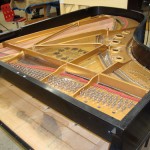 Environmental tips
Environmental tips
Wood is a natural, live, constantly changing material, which reacts to the environment in which it is kept. Since the piano is mostly made of wood, it is preferable to place it in rooms where temperature and humidity do not fluctuate too drastically.
If room humidity is higher than suggested levels (humid regions and during intermediate seasons), we recommend you use a common dehumidifiers which is easily available. The humidity level should never be lower than 45% or higher than 65%.
If room humidity is too low (heated rooms during winter seasons), we recommend you use a common humidifier again easily available. The piano should never be left in a dry room.
We suggest you position your piano far from windows and external walls. In order to avoid case damage we suggest you do not place the piano in direct sunlight. We advise you never to place piano in a room with a heated-floor system.
We also suggest that you do not place any objects on the piano as this may cause vibrations. Please note that should any liquid fall on the piano you will be risking serious damage.
Maintenance
Purchasing a piano represents a long-term and substantial investment; maintaining its optimal performance will ensure your satisfaction and help maintain the value of your piano.
The lifespan of your piano greatly depends on the regular care and attention it receives. Routine maintenance should only be assigned to an officially certified technician. Be sure to verify your technician’s credentials.
There are three determining factors in the piano sound quality:
- Tuning
- Action
- Voicing
Tuning
Human hearing can adapt itself very easily. Often we are not able to recognize whether an instrument is out of tune. A piano does not go out of tune easily. Tuning is a condition that can be modified by gradual alterations to which our ears become accustomed. Human hearing is unable to perceive slight changes of frequency, especially if these changes occur across the keyboard.
Action regulation
As you do not play each note consistently the keyboard and action are subject to un-even wear and tear. This wear and tear triggers slight alterations in the uniform response of the keyboard action. Maintaining a well-regulated action is essential to preserving a fine touch and tone.
Voicing
The quality of tone on your piano is mainly determined by the density and condition of the felt found on the hammerhead. A suitably qualified technician will “voice” felt around the hammerhead with a fine three-needle voicing tool.
Hammerheads undergo changes as a result of normal wear and climatic variations, which results in an audible unevenness of sound. A suitably qualified technician will re-establish the evenness and beauty of the sound and timbre.
For the reasons mentioned above, even if your piano is rarely used, we recommend the following:
- Tune your piano at least twice a year
- Check the action and voicing at least once a year
- Always assign the job to a highly qualified technician
Care of a Steinway piano
The piano components are finished with different treatments. Caring for these surfaces must be performed with great care.
To clean matt-finish surface, we recommend using a soft cloth slightly moistened with non-abrasive detergent and applied with slight pressure in clockwise motion.
To clean high-gloss finish, we recommend dusting the surfaces using a soft cloth slightly moistened with non-abrasive detergent. Do not use any type of abrasive detergent.
Metal components
Metal parts need some care as well. The hinges and screws are plated with 18K-gold. This finish should be dusted by using a soft cloth slightly moistened with non-abrasive detergent. To remove the oxidation on all the brass components (lock and brand name) we suggest using common de-oxidation crème that is non-abrasive.
Cleaning the keyboard
To clean the keyboard, we recommend using a soft cloth slightly moistened with non-abrasive detergent. It is important to avoid excessive moisture on the lateral sides of the keys.
Moving
In case you need to store or move your piano, we recommend using a professional mover, especially qualified to move pianos. Using unqualified personnel can cause serious damage to the piano.
